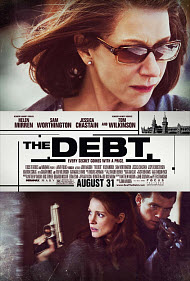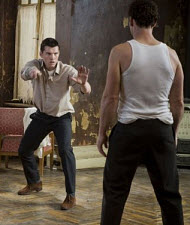The Debt
 for some violence and language.
for some violence and language.
Reviewed by: Julia Webster
CONTRIBUTOR
| Moral Rating: | Offensive |
| Moviemaking Quality: |
|
| Primary Audience: | Adults |
| Genre: | Thriller Drama Remake |
| Length: | 1 hr. 54 min. |
| Year of Release: | 2010 |
| USA Release: |
October 17, 2010 (festival) August 31, 2011 (wide—1,700+ theaters) DVD: December 6, 2011 |





deception / lying
Mossad secret agents
spies in the Bible
murder in the Bible

Why does God allow innocent people to suffer? Answer
What about the issue of suffering? Doesn’t this prove that there is no God and that we are on our own? Answer

Does God feel our pain? Answer
ORIGIN OF BAD—How did bad things come about? Answer
Did God make the world the way it is now? What kind of world would you create? Answer
PERSECUTION—Why and how should followers of Christ pray for suffering Christians? Answer

hunting down Nazi war criminals
insane asylum
fertility doctor and pregnancy
abduction

ex husband ex wife relationship
SUICIDE—What does the Bible say? Answer
If a Christian commits suicide, will they go to Heaven? Answer
mother daughter relationship

love triangle
loss of friend



| Featuring |
|---|
|
Helen Mirren … Rachel Singer Jessica Chastain … Young Rachel Tom Wilkinson … Stephan Gold Marton Csokas … Young Stephan Ciarán Hinds … David Peretz Sam Worthington … Young David See all » |
| Director |
| John Madden—“Miss Sloane” (2016), “The Best Exotic Marigold Hotel” (2011), “Proof” (2005), “Shakespeare in Love” (1998) |
| Producer |
|
Marv Films Pioneer Pictures Mairi Bett … co-producer See all » |
| Distributor |
This line from John Madden’s latest film, “The Debt,” provides a perfect summary of the film. “The Debt” is an excellent remake of a 2007 Israeli film.
Proverbs 6:1-19 well describes what is about to happen in the film:
“There are six things that the LORD hates, seven that are an abomination to him: haughty eyes, a lying tongue, and hands that shed innocent blood, a heart that devises wicked plans, feet that make haste to run to evil, a false witness who breathes out lies, and one who sows discord among brothers.”
Three young Israeli Mossad agents undertake to capture a Nazi war criminal, and their mission goes terribly awry. The trio must pursue the enemy within Soviet-occupied East Berlin, which leads to the initial failure of the kidnapping. After fleeing the Soviets, they take the Nazi into captivity, with the three agents locked together in an apartment to guard him. Unfortunately, agents Stephan, David, and Rachel, will not learn the wisdom of Romans 12:17-19:
“Do not repay anyone evil for evil. Be careful to do what is right in the eyes of everybody. If it is possible, as far as it depends on you, live at peace with everyone. Do not take revenge, my friends, but leave room for God’s wrath, for it is written: ‘It is mine to avenge; I will repay,’ says the Lord.”
Over time, Stephan, David, and Rachel begin to feel as locked up as their prisoner. The Nazi, who had been an evil doctor during the war, is able to manipulate his captors both mentally and physically and eventually…
What transpires is a series of deception and lies that have a devastating effect on all three of the young agents, continuing throughout their lives. As the line between good and evil becomes blurred, we remember that…
“The heart is deceitful above all things and desperately sick” (Jeremiah 17:9).
The story is told through a series of flashbacks and unlike many movies of this type, the flashbacks are easy to follow, keeping the deep political intrigue from becoming too difficult to understand. The story-telling is excellent, taking us from the political intrigue and brutal battles into a love triangle, which, though equally intense, is often shown subtly through looks and simple hand movements.
The acting by the ensemble cast is excellent, with the two actresses who play Rachel (Jessica Chastain as the young Rachel, and Helen Mirren as the older Rachel) being the most compelling. Marton Csokas portrays the young Stephan, showing his changes from team player to aggressive leader.
Interestingly, the only curse word noted in the film, “f**,” is well-used to show the fear and anger that Stephan feels, as he is the only one who uses the word and then only during times of great duress.
The film’s R-rating is well-earned, as is often the case in stories concerning the Nazi holocaust. Deception is the main topic of the film, and it is shown through great suspense and graphic violence. Sexuality is moderate, with a few scenes that are somewhat offensive, including gynecological exams (not shown in detail, but still very uncomfortable to watch) and a couple of sexual encounters.
Viewers need to keep in mind that the violence is often graphic, including brutal, sometimes sadistic, fighting. The battles include stabbing with knives and syringes, slashing with pieces of broken glass, strangling, and many body blows. A horrifying suicide is also shown.
“The Debt” is worth seeing, because of its political intrigue and suspense, as well as its devastating love triangle, and how lies can change our lives.
The older Stephan says toward the end of the film, “Truth is luxury…” Thankfully, though, truth is readily available to all people through God’s Word (John 17:17) and faith in Jesus Christ (John 14:6). Jesus tells us if we hold to His teaching, the truth will set us free (John 8:30-31). Our three protagonists learn a hard lesson about truth.
Violence: Heavy / Profanity: Moderate / Sex/Nudity: Moderate
See list of Relevant Issues—questions-and-answers.


The performances by the leading actors are especially note-worthy because all of them had credible Jewish and German accents. ***SPOILER*** I could certainly identify with David when he beat the crap out of Vogel when pushed to his breaking point, not because I’ve lost someone I loved, but because I know what it is like to stand by and watch while someone you love is suffering. ***END SPOILER***
Worth viewing alongside “Schindler’s List” and “The Boy in the Striped Pyjamas.” There is some brief strong language (the f-word, used about five or six times) and some violence, part of it surprising and shocking. Excellent movie.
Moral rating: Average / Moviemaking quality: 5
Moral rating: Very Offensive / Moviemaking quality: 3½
Moral rating: Average / Moviemaking quality: 4½
Moral rating: Average / Moviemaking quality: 5
I do not disagree with the message, it is just that the transition to Israel from Berlin does not wear well cinematically. The shots of what was meant to be a hospital in Ukraine were good. My summary—overly violent melodrama masquerading as serious drama and thriller.
Moral rating: Offensive / Moviemaking quality: 4
PLEASE share your observations and insights to be posted here.

My Ratings: Moral rating: Average / Moviemaking quality: 3½